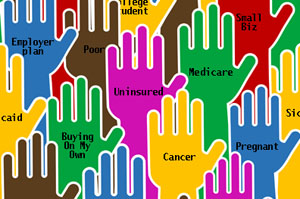With just over a week until the March 31 deadline to sign up for health insurance, backers of the health law -- from President Barack Obama on down -- are engaged in a full-force campaign to enroll eligible Americans, especially younger ones who tend to be healthier and less costly to insure. But the landmark law still faces opposition from Republicans and a public that remains skeptical the law can improve health coverage while lowering its cost.
 The law has already altered the health care industry and established a number of consumer benefits. It also has sweeping ramifications for state officials, employers, hospitals and doctors.
The law has already altered the health care industry and established a number of consumer benefits. It also has sweeping ramifications for state officials, employers, hospitals and doctors.
Following the botched Oct. 1 rollout of the online marketplaces, or exchanges, federal officials now say healthcare.gov works for the “vast majority of users.” On March 17, Centers for Medicare and Medicaid Services Administrator Marilyn Tavenner announced exchange enrollment had reached 5 million.
But some problems remain. For example, many of the site’s “back end” functions, which provide insurers with more information about enrollment and let the government know if enrollees have paid their premiums, are still being built.
Here's a primer on how the law might affect you.
I don't have health insurance. Under the law, will I have to buy it, and what happens if I don’t?
You have until March 31 to enroll in health insurance before you are subject to the law’s tax penalty for not having coverage. Administration officials have said they will not extend this deadline.
For individuals, the penalty this year is the greater of either $95 or up to 1 percent of the portion of the person’s modified adjusted gross income that exceeds $10,150, which is the level that requires you to file a tax return. That rises to $695, or 2.5 percent of income, by 2016. For families this year the penalty is $285 or 1 percent of the portion of modified adjusted gross income over $20,300. That will grow in 2016 to $2,085 or 2.5 percent of household income, whichever is greater.
The requirement to have coverage can be waived for several reasons, including financial hardship or religious beliefs. Also on the list are people in the individual insurance market whose plans were canceled. Under the law’s "hardship exemption," these consumers are also eligible to buy "catastrophic" coverage policies, which have lower premiums and higher deductibles than other plans that comply with the law.
Federal officials also announced that people with plans in the individual market that did not yet meet health law requirements could keep those policies for another two years if their states allow it and insurers continue to offer the plans.
If you have an income that would make you eligible for Medicaid under the provisions of the health law, but your state opted not to expand its Medicaid program, you generally cannot qualify for a subsidy to purchase coverage. However, you are also exempted from the penalties for not having insurance.
What if computer problems with the federal or a state-based exchange prevented me from purchasing health insurance? Do I still have to purchase coverage by March 31?
Yes. If computer glitches prevented you from enrolling, you can receive retroactive coverage to Jan. 1 or the date in 2014 when you originally applied, as well as retroactive premium tax credits and cost-sharing subsidies, according to administration guidance released earlier.
In addition, if you gave up trying to buy a plan because of technical issues, and instead you bought one outside the exchange, you may be able to switch to a marketplace plan and qualify for retroactive subsidies.
If you are still encountering difficulties, consumer advocates suggest you try to meet with one of the law’s navigators or assistors to get hands-on help. You can also contact an insurance agent or broker who may be able to help you through the application process or call Healthcare.gov at 800-318-2596 to get help.
I get my health coverage at work and want to keep my current plan. Will I be able to do that? How will my plan be affected by the health law?
If you get insurance through your job, it is likely to stay that way. But, just as before the law was passed, your employer is not obligated to keep your current plan and may change premiums, deductibles, co-pays and network coverage.
The law has already made several changes to employer-sponsored insurance. For example, plans generally now ban lifetime coverage limits and include a guarantee that an adult child up to age 26 can stay on her parents' health plan. More than 3 million young adults have been able to stay on their parents’ plan due to this provision, according to administration figures.
What other parts of the law are now in place?
Insurers are no longer allowed to deny you coverage or charge you more based on a pre-existing medical condition. They also can’t place annual limits on medical coverage of essential health benefits, which include prescription drugs and hospitalization.
You are likely to be eligible for some preventive services such as breast cancer screenings and cholesterol tests, with no out-of-pocket costs.
Health plans can’t cancel your coverage if you get sick – a practice known as "rescission" – unless you committed fraud when you applied for coverage.
Insurers have to provide rebates to consumers if the companies spend less than 80 to 85 percent of premium dollars on medical care. According to the White House, in 2013 about 8.5 million enrollees were to receive rebates averaging $100 per family. Earlier this month, the administration signaled it will temporarily allow a higher proportion of premiums to be spent on administrative costs in an effort to compensate insurers for additional work they faced when glitches with federal and state health exchanges caused enrollment problems.
Some plans that were in place when the law was passed and have not changed significantly do not have to abide by certain parts of the law. For example, these "grandfathered" plans can still charge beneficiaries part of the cost of preventive services.
I want health insurance but I can't afford it. What will I do?
Depending on your income, you might be eligible for Medicaid. Before the health law, in most states nonelderly adults without minor children didn’t qualify for Medicaid. But now, the federal government is offering to pay the cost of an expansion in the programs so that anyone with an income at or lower than 138 percent of the federal poverty level, (about $16,105 for an individual or $32,913 for a family of four based on current guidelines) will be eligible for Medicaid.
 The Supreme Court, however, ruled in June 2012 that states cannot be forced to make that change. So far, 25 states and the District of Columbia have chosen to expand Medicaid.
The Supreme Court, however, ruled in June 2012 that states cannot be forced to make that change. So far, 25 states and the District of Columbia have chosen to expand Medicaid.
What if I make too much money for Medicaid but still can't afford to buy insurance?
You might be eligible for government subsidies to help you pay for private insurance sold in the state-based insurance marketplaces.
These premium subsidies will be available for individuals and families with incomes between 100 percent and 400 percent of the poverty level, or about $11,490 to $45,960 for individuals and $23,550 to $94,200 for a family of four (based on current guidelines).
The subsidies are pegged to the federal poverty level and are most generous for those who make the least amount of money. They also require individuals to spend a certain amount of their income before the subsidies kick in.
For example, those who earn between the poverty level and twice that, or up to about $23,000 for an individual and $39,000 for a family of three have to pay between 2 to 6 percent of their income towards the premium before the subsidy begins. People who earn two to three times the poverty rate – up to about $34,500 for an individual or $56,000 for a family of three – must pay up to 8 percent of the premium cost before the subsidy starts.
Will it be easier for me to get coverage even if I have health problems?
Insurers are now barred from rejecting applicants based on health status.
I own a small business. Will I have to buy health insurance for my workers?
No employer is required to provide insurance. But starting in 2016 – a two-year delay from the previous date of 2014 – businesses with 50 to 99 employees that don't provide health care coverage and have at least one full-time worker who receives subsidized coverage in the health insurance exchange will have to pay a fee of $2,000 per full-time employee. The firm's first 30 workers would be excluded from the fee. In addition, starting next year, employers with 100 or more employees will be required to offer insurance to 70 percent of workers rather than 95 percent as the law previously required. They will have to cover 95 percent of workers starting in 2016.
However, firms with fewer than 50 people won't face any penalties.
In addition, if you own a small business and purchase insurance through the health marketplace, the health law offers a tax credit to help cover the cost. Employers with fewer than 25 full-time workers who earn an average yearly salary of $50,000 or less can qualify. Employers must pay at least 50 percent of their full-time employee’s premium costs to get the credit.
This article was reprinted from kaiserhealthnews.org with permission from the Henry J. Kaiser Family Foundation. Kaiser Health News, an editorially independent news service, is a program of the Kaiser Family Foundation, a nonpartisan health care policy research organization unaffiliated with Kaiser Permanente.












